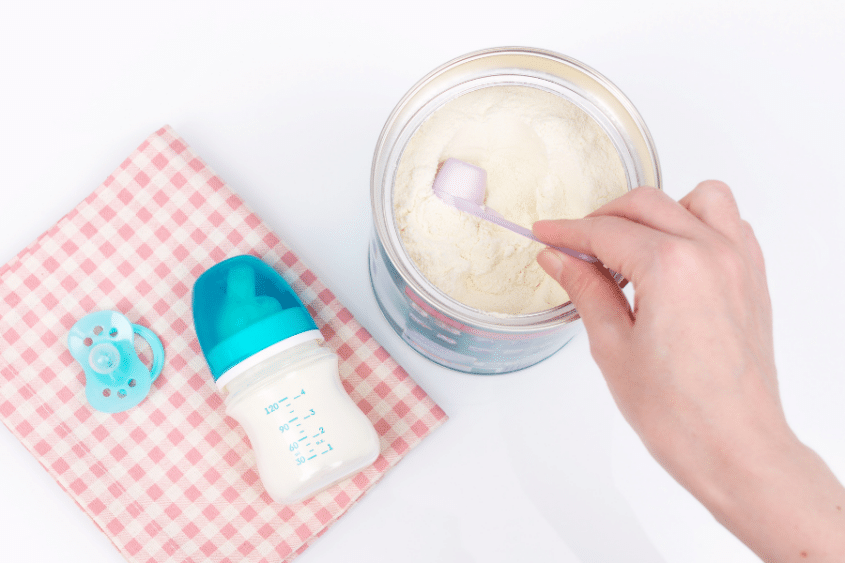
Nutrition is important to every person – no matter if they are a newborn to senior age. For parents of newborns or infants, it should be a priority as it can help with their growth and development as they get older.
The important thing to remember is that you’ll want to make the best choices when it comes to their health and safety. Their nutritional needs should be addressed safely – which we will show you how in this guide.
Ready to stay a step ahead and worry less? Let’s discuss what you need to know now.
Is Organic Baby Formula A Good Option?

The short answer: yes. To further elaborate, organic baby formula could be the best option for your baby when it comes to their nutritional needs. In the first year of their lives, the physical and cognitive development of a baby will be most critical. As such, meeting their nutritional needs will be more than necessary.
Organic baby formulas are becoming popular because of the best quality it offers. Not to mention, its purity compared to other formulas is much greater.
Most baby formulas on the market have additives and synthetic ingredients that can harm a baby’s nutritional needs. However, HiPP Dutch Bio Combiotik has none of that and features plenty of ingredients that are great for gut health.
Why Should Parents Avoid Additives and Synthetic Ingredients?
The answer to this question is obviously clear. Additives and synthetic ingredients (among other toxic ingredients) will increase plenty of health concerns as a baby gets older. This includes metabolic disorders and even an increase in childhood obesity. The reason for this is that corn syrup and other sweeteners are included for the purpose of enhancing taste.
However, organic baby formulas follow a set of strict guidelines that will not only apply to natural sweetness from lactose, but also avoid the addition of additives and synthetic ingredients. Including harmful substances into a baby’s diet will lead to poor nutrition and subpar development in the future.
That’s why there are plenty of organic options to consider as opposed to the conventional formula that is on the market.
By avoiding additives and synthetics you will be able to contribute positively to a child’s health. Whether they are newborns or infants, choosing a formula will be critical. Plus, it will lay the groundwork on what to plan and choose for your child as they grow older.
What Strategies Should Parents Implement for Optimal Health?

Implementing the right strategies for optimizing your baby’s health will be important. For this reason, we’ll provide you with ideas on what you can do to help improve and maintain their health for the better now and in the years that follow.
They include implementing these approaches:
- Gradually introduce a balanced diet: Including a nutrient-rich diet such as solids (when the time comes) will be critical when they grow. By including this with formula, their diet will be well-rounded as they get older. The sooner you introduce something like this, the better. Plus, it will help develop a child’s mindset that eating better is normal compared to anything else.
- Monitor allergies and sensitivities accordingly: It is important to keep an eye out for any allergies or sensitivities that your baby might have. This will allow you to plan and prepare their diet ahead of time so you know what to avoid. Organic formulas will reduce certain food tolerance and allergic reactions because of the clean ingredients.
- Schedule and maintain a pediatric checkup schedule: Just because you’re providing your child with a well-balanced and healthy diet, doesn’t mean it’s a substitute for regular medical checkups. Be sure to schedule regular checkups for your child from the time they are a baby until they grow through childhood.
Again, this emphasizes the importance of making sure their health is a priority while instilling the principle that it is normal to get checkups to stay ahead of things while creating a healthy environment at home that can be good for the heart and other parts of your body.
- Make food safety a priority: Prepare formula and food with clean utensils and store foods and containers properly. This will curb any bacterial contamination that might arise.
Final Thoughts
Your baby’s nutrition is always something to pay attention to when it comes to healthy development and growth. Be sure to introduce as many organic foods as possible while avoiding additives and synthetic ingredients – even if they are intent on providing some kind of good for the baby.
Be vigilant of such ingredients that can stifle a baby’s health rather than contribute to it. Finally, make sure that you follow the tips and strategies we have listed above to ensure your child grows up with a healthy lifestyle that will benefit them in the long run.
